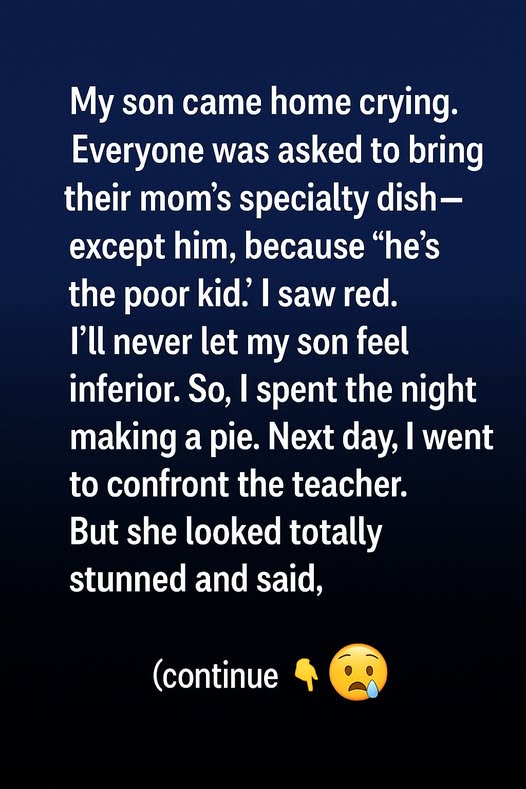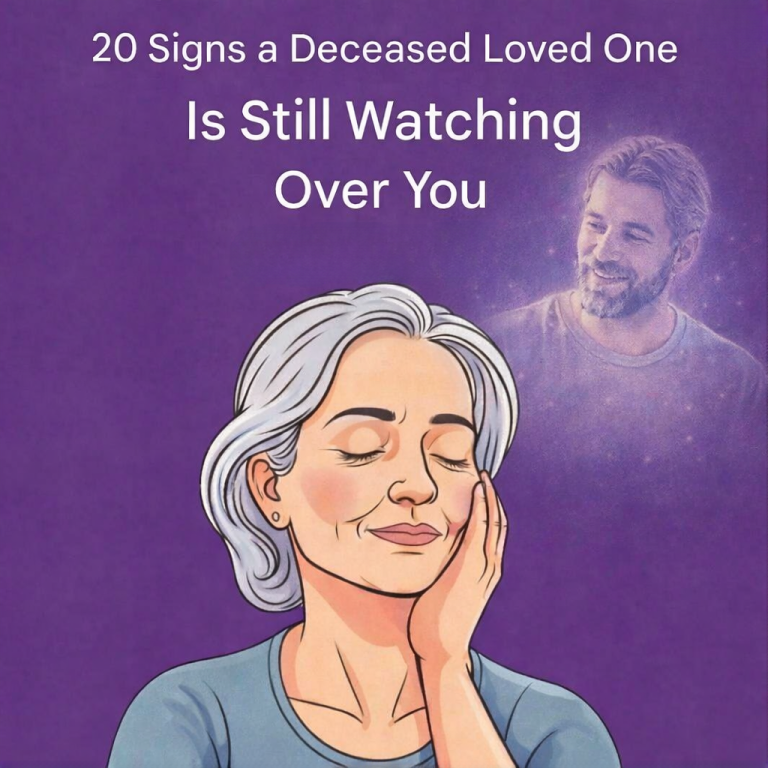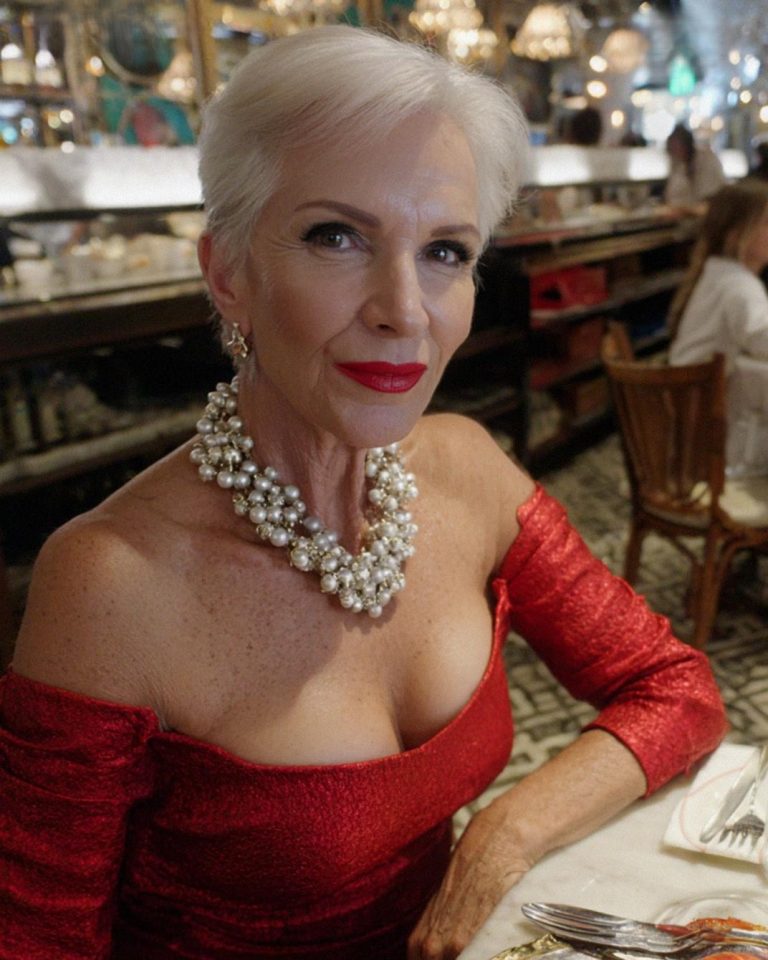
My son came home crying.
His little face was red and blotchy, and he clutched his backpack like it was the only thing holding him together. When I asked what happened, he choked out the words between sobs.
“Everyone was asked to bring their mom’s specialty dish for Family Heritage Day,” he said, “but… Mrs. Carter said I didn’t need to. Because I’m the poor kid.”
For a moment, I didn’t breathe.
My ears rang. My vision blurred with disbelief and fury. The poor kid?
I’d worked so hard to keep our struggles private—to make sure he never felt less than anyone else. I’d taken double shifts, skipped meals, done everything I could so my son could stand tall in a world that looked down on people like us.
And now, some teacher had reduced him to a label.
I saw red.
That night, after I tucked him in, I sat at our tiny kitchen table and stared at my hands. They were rough from cleaning houses all day, but they could still create something beautiful.
So I decided I would make something that showed my son—and everyone else—exactly who we were.
At midnight, I pulled out the ingredients: a few apples, some leftover flour, and a stick of butter I’d been saving. It wasn’t much, but it was enough.
I rolled the dough carefully, slicing the apples as my mother once taught me. That recipe had been passed down through generations, from women who’d lived through war, famine, and heartbreak—and still found a way to sweeten life for their families.
By dawn, the pie was cooling on the windowsill, golden and perfect. It wasn’t fancy, but it was ours.
The next morning, I walked my son to school, pie in hand. His head hung low, but I made him look at me.
“Listen to me, baby,” I said softly. “There’s nothing shameful about who we are. This pie isn’t just food—it’s history, love, and strength. And that’s something no one can take from you.”
When we reached the classroom, I took a deep breath and knocked.
Mrs. Carter looked up from her desk, startled.
“Oh—Mrs. Lane,” she said, blinking. “Is everything all right?”
“No,” I said firmly. “It’s not.”
The room went quiet. Parents and students turned to look. I could feel the weight of every eye in that classroom, but I didn’t waver.
“My son came home crying yesterday,” I said, my voice steady. “He told me he wasn’t asked to bring a dish because you thought he was the poor kid. Care to explain?”
Mrs. Carter’s face went pale. She looked utterly confused.
“I—I never said that,” she stammered. “I would never say that. I told the class your son didn’t need to bring anything because he’d already brought something special.”
I frowned. “What do you mean?”
She smiled softly, still clearly shaken but sincere.
“Last week, when we were collecting items for the local shelter, your son donated his favorite toy. He told the class, ‘Some kids don’t have anything, so I want to share what I love most.’”
The classroom fell silent.
My son stared at the floor, embarrassed, as Mrs. Carter continued.
“I told the children that kindness like his was a dish in itself—that it feeds the soul more than any food ever could. That’s why I said he didn’t need to bring anything.”
My throat tightened. I looked down at my son—my sweet, selfless boy—who thought he’d been pitied, when in fact he’d been honored.
Mrs. Carter walked closer and smiled warmly. “But I see you brought something anyway.”
I nodded, blinking away tears. “It’s an old family recipe,” I said softly. “From my mother’s hands to mine.”
We set the pie on the table among dishes from all around the world—lasagna, samosas, dumplings, enchiladas—and soon the whole classroom filled with the smell of cinnamon and home.
When it was time to eat, the children lined up eagerly. Some went straight for the fancy dishes their parents had prepared. But slowly, one by one, they began gravitating toward our pie.
Mrs. Carter cut slices, and soon the entire room was filled with the sound of content chewing and quiet joy.
One little girl smiled and said, “This tastes like my grandma’s kitchen.”
Another boy added, “It’s like Christmas.”
And my son… oh, the way his face lit up. His pride returned, pure and unshakable.
For the first time in a long time, I saw the same spark in his eyes that his father used to have before he passed away—the look of someone who knew his worth.
After class, Mrs. Carter pulled me aside.
“I’m sorry for the misunderstanding,” she said gently. “Your son is special. You’re raising him right.”
I smiled through my tears. “He’s the one teaching me,” I admitted. “I thought I was defending him, but he’s the one who reminded me what really matters.”
That night, when we got home, my son ran up and hugged me.
“Mom,” he said softly, “everyone loved your pie. Mrs. Carter even asked for the recipe.”
I laughed and kissed his forehead. “It’s not just a recipe, sweetheart,” I said. “It’s a story. Ours.”
He smiled. “Then we should share it again next year.”
From that day forward, the “Family Heritage Day” at his school wasn’t just about food—it became a celebration of kindness and resilience. The students began collecting donations every year to help struggling families in the community.
The event was renamed “The Heart Dish Project.”
And right in the center of every table, no matter the year, there was always one apple pie—warm, simple, and made with love.
Because in the end, what defines us isn’t what we have—it’s what we give.
And sometimes, the poorest hearts hold the richest lessons of all.



